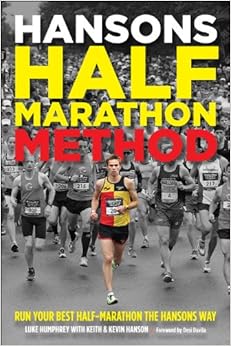The idea of running at a really easy pace was new to me when I started following formal training plans. How would running slowly help me run faster? I tried to read articles about it, but all the talk about mitochondria and capillaries and fast-twitch versus slow-twitch muscles made me snooze.
I mentioned that I'm reading Hansons Half Marathon Method. Theirs is a popular though slightly controversial approach to marathons that they've adapted for half marathons. The foundation of the method is cumulative fatigue, which is basically a lot of running without full recovery so that your training mimics the type of fatigue you encounter in a race. I was interested in reading about this method because I read so many recaps of runners who used the method and claim to have fresh legs and have no problems in the marathon. Plus, those runners who previously got injured training had no injuries on the Hansons plan and feel fit and great. Here is one such account. One of the method's components is high mileage. Their beginner half marathon program--an 18-week program--peaks at 48 miles a week. That's why it's controversial--many believe that recreational runners shouldn't be running that much. About 60% of that mileage is easy running, though.
The book spends a lot of time addressing all the benefits that easy running brings. It improves muscle fiber development, energy utilization, capillary development, cardiovascular strength, and structural fitness. I made myself read though all the passages about mitochondria and capillaries, and I have to say that now that I understand it, it makes a lot of sense. The gist is that easy running can make you a better runner physiologically. This concept is not unique to the Hansons Method but has lots of research and data supporting it. You can find many articles on the benefits of easy running if you do a search, but this article from Runner Academy summarizes the benefits nicely.
Most of the articles on easy running say that most runners do easy runs too fast. While there are lots of benefits to running slowly, there doesn't seem to be any benefit to running easy runs too fast--unless the benefit is to your ego so that you don't have to record a slow pace. This is from the above linked Runner Academy article: "Allowing your easy runs to become run at a faster pace is not improving
you as a runner, but rather training entirely different energy systems
that you are likely targeting in harder workouts such as speed sessions.
If easy runs are always run at a harder than necessary pace you will
experience reduced performance on your harder workout days and stress
the body to the point of risking injury and overtraining."
The Hansons Method calls for easy runs to be 1:30-2:30 minutes slower than goal race pace (and the method also describes when you should run at the faster versus slower end of that range.) My goal half marathon pace is 11:00, which means I should be running between 12:30-13:30 for an easy pace. I've been doing easy runs at 11:30-12:30. While I'm not following the method, the book has convinced me to slow down. There's no harm in it but instead has lots of benefits. I'll be trying to keep to this pace for my Tuesday and Thursday runs.
I'll be talking about high mileage the method advocates in another post. Labels: Hansons Half Marathon Method
